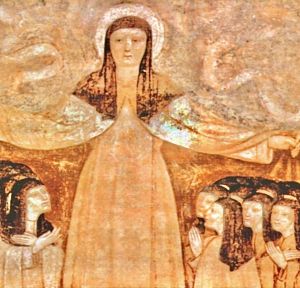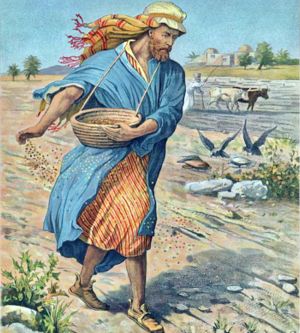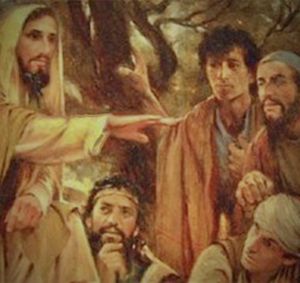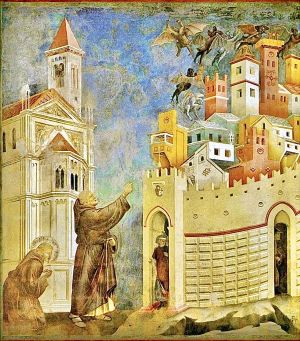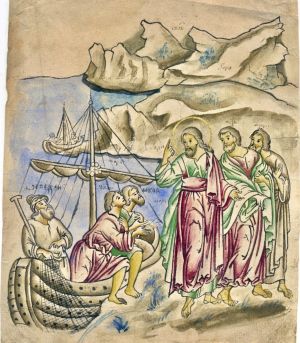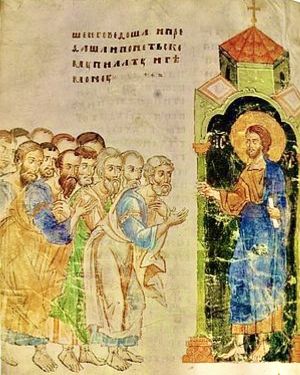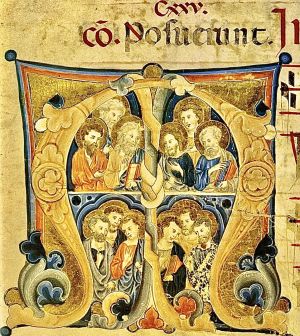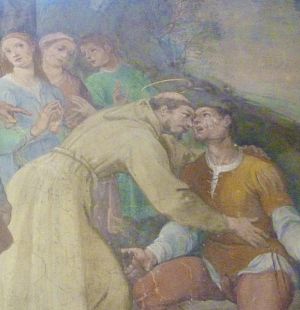
Teresa Girolami
Teresa Girolami è laureata in Materie letterarie e Teologia. Ha pubblicato vari testi, fra cui: "Pellegrinaggio del cuore" (Ed. Piemme); "I Fiammiferi di Maria - La Madre di Dio in prosa e poesia"; "Tenerezza Scalza - Natura di donna"; co-autrice di "Dialogo e Solstizio".
Mustard grains and exponential growth
Jesus tells parables about the Kingdom of God, taking his cue from the elements of nature: seed, ear, mustard seed, and more.
With natural and real hooks he explains the physiognomy of the Kingdom.
Francis and Clare of Assisi were two grains of mustard seed that grew in humility and hiddenness and became such large trees that many creatures found shelter on their branches.
Specifically, the Papal Bull of canonisation 'Clara Claris praeclara' speaks of Clare as follows:
«This was the tall tree, reaching towards the heavens, with large branches, which in the field of the Church produced sweet fruit [...] and in whose pleasant and pleasant shade many followers flocked from all sides, and still flock to enjoy its fruits» (FF 3294).
The Kingdom of God finds development in these singular metaphors of which the Poor Man of Assisi and the recluse Clare are plastic and concrete testimonies.
But Francis too, like Jesus, spoke to his brothers in parables. The Sources attest to this in various passages.
When he wanted to make them understand the path that awaited them in order to welcome the Kingdom of God, he called to mind various parables, traversed in the fabric of the Gospel.
We recall one among many, with which he announced the Word that the Lord entrusted to him.
By presenting himself to the Pope, Jesus made him understand how he had to express himself.
"He, in fact, told the Pontiff as God had suggested it to him, the parable of a rich king who, with great joy, had married a beautiful and poor woman and had children who had the same appearance as the king, their father, and who, therefore, were brought up at the king's own table.
He then gave the interpretation of the parable, coming to this conclusion:
«There is no need to fear that the sons and heirs of the eternal King should starve; for they, in the likeness of Christ, were born of a poor mother, by virtue of the Holy Spirit, and were begotten, by virtue of the spirit of poverty, into a poor religion.
For if the King of heaven promises his imitators the eternal kingdom, how much more will he provide for them those things which he bestows without distinction upon the good and the bad».
The Vicar of Christ listened attentively to this parable and its interpretation and, filled with wonder, recognised without a shadow of doubt that, in this man, Christ had spoken.
But he also felt reassured by a vision he had at that time, in which the Spirit of God had shown him the mission to which Francis was destined.
In fact, as he recounted, in his dream he saw that the Lateran Basilica was about to ruin and that a poor, small, contemptible-looking man was supporting it, putting his shoulders under it, so that it would not fall.
«Truly," the Pontiff concluded, «this is the one who by his work and doctrine will uphold the Church of Christ» (FF1064).
"Counting on divine grace and papal authority, Francis, full of confidence, set out for the Spoleto valley, ready to practise and teach the Gospel" (FF 1065).
These parables are also a narrative of the coming of the Kingdom of God, its expansion in the mustard seed of Francis and Clare, and their incredible development.
«And he said: How shall we compare the Kingdom of God? Or in what parable shall we put it? As to a grain of mustard seed which when sown on the earth is smaller than all the seeds on earth» (Mk 4:30-31)
Friday, 3rd wk. in O.T. (Mk 4:26-34)
Lamp under the bushel?
Granted that Francis considered the preachers of the Word to be the «lamp of the world» and that the Spirit of God made him so, marvellous is what we read in the Sources, an exalted collection of Franciscan realities.
"Irradiated by the splendours of eternal light, he scrutinised the depths of the Scriptures with a clear and acute intellect.
His intellect, pure from all stain, penetrated the secret of the mysteries, and where the science of masters is excluded, he entered with the affection of a lover.
He read, from time to time, the sacred books and kept tenaciously imprinted in his memory what he had once assimilated: for he continually ruminated with affectionate devotion what he had listened to with an attentive mind" (FF 1187).
Likewise Clare, seraphic little plant, is recognised in the
Legend as the one in whom "the merciful God [...] made a very bright lamp shine for women: and you, most blessed Father*, by ascribing her to the number of the Saints, prompted by the power and evidence of miracles, have placed this lamp on the candelabrum, so that it may give light to all those who are in the house" (FF 3151).
"So Clare, while she was alive, shone by the light of her merits: and now, that she is bathed in endless clarity, no less does she still shine, by the marvellous light of miracles, to the ends of the earth" (FF 3262).
It was a miracle to see her (when she lived within the Damianite walls exuding holiness):
"[...] for Matins, she would prevent the young girls and, waking them noiselessly with nods, she would invite them to the praises of God. Often, while they were all still asleep, she would light the lamps, often she herself would ring the bell with her hands" (FF 3200).
"Certainly, in his gentleness, God had given the poor girl a banquet and, after having flooded her soul in prayer with his eternal Light, he manifested it outside sensibly" (FF 3199).
«Does the lamp come to be put under the bushel or under the bed?» (Mk 4:21)
*St Clare's canonisation took place in Anagni by Pope Alexander IV on an unspecified date, varying between August, 26 September and 19 October 1255.
Thursday 3rd wk. in O.T. (Mk 4,21-25)
Sower and Soil
In the Parable of the Sower, Jesus emphasises the different reception and assimilation of the Word of God, and consequently the different fruit, depending on the suitability of the soil.
The new Evangelist of the latter time, Francis, was in love with the Word of God and listened to it constantly, so much so that it was imprinted in his memory.
It was good soil that produced one hundred per cent.
The Sources inform us:
"Irradiated by the splendours of the eternal Light, he scrutinised the depths of the Scriptures with a clear and acute intellect.
His intellect, pure from all stain, penetrated the secret of the mysteries [...].
He read from time to time the sacred books and kept tenaciously imprinted in his memory what he had once assimilated: for he continually ruminated with affectionate devotion what he had listened to with an attentive mind" (FF 1188).
"With equal care and devotion he committed himself to the other teachings he had heard.
For he had never been a deaf hearer of the Gospel, but, entrusting everything he heard to a commendable memory, he sought with all diligence to carry it out to the letter' (FF 357).
As Celano calls him, in the Vita prima - "river of Paradise" - Francis, "the new evangelist of this last age spread the waters of the Gospel with loving care throughout the whole world, and by his works he pointed out the way and the true doctrine of the Son of God" (FF 475).
In the Regola non bollata (1221):
"Let us therefore hold fast to the words, life, doctrine and Holy Gospel of Him who deigned to pray for us to the Father" (FF 62).
And "let us beware of being the ground along the road, or the stony ground, or the ground overrun with thorns according to what the Lord says in the Gospel:
«The seed is the Word of God [...] the seed entrusted to the good soil, are those who, hearing the word with good, indeed excellent dispositions, understand and guard it and bear fruit with perseverance»" (FF 58).
The little Poor was, for his time, a concrete and fruitful incarnation of the Gospel.
«And other seeds fell on the good earth and bore fruit by rising and growing and bearing one thirty and one sixty and one hundred» (Mk 4:8)
Wednesday 3rd wk. in O.T. (Mk 4,1-20)
Will of God, the watershed of spiritual kinship
With an astonishing twist of hand, Jesus explains who his mother and brothers are: those who embody the will of God.
After their conversion, Francis and Clare always sought God's will by looking to Mary, the handmaid of the Lord, the one who had found favour with the Almighty by becoming the Mother of Jesus.
Francis, from the very beginning of his vocation-mission paid special and devoted attention to the Virgin.
The Sources make us aware of his extraordinary love for Her, summed up by a hieratic antiphon of the Poverello:
"Holy Virgin Mary, there is none like thee, born in the world, among women, daughter and handmaid of the most high King the heavenly Father, mother of our most holy Lord Jesus Christ, spouse of the Holy Spirit; pray for us with Saint Michael the Archangel and with all the powers of heaven and with all the saints, to thy most holy beloved Son, Lord and Master" (FF 281).
Francis 'surrounded the Mother of Jesus with an unspeakable love, because she had made the Lord of majesty our brother' (FF 786).
But Clare herself was considered 'altera Maria' when she arrived at the Portiuncula, where Francis and the brothers awaited her for her total dedication to God:
"After she had taken the insignia of holy penance before the altar of St. Mary and, as if before the nuptial thalamus of the Virgin, the humble handmaiden had been married to Christ, immediately St. Francis led her to the church of St. Paul*, with the intention that she should remain there until the Will of the Most High disposed otherwise" (FF 3172).
Like Mary, Clare pronounced her "Fiat" to the will of the Father.
Oh how they both loved the will of God!
Forgetting themselves, they adhered to the divine plan for them, each in their own time, each in their own groove.
In the Sources again:
"In the same way, then, that the glorious Virgin of virgins bore Christ materially in her womb, you too, following his vestiges, especially of his humility and poverty, can always, without any doubt, bear him spiritually in your chaste and virginal body.
And you will contain in you Him by whom you and all creatures are contained, and you will possess that which is the most lasting and definitive good even in comparison with all the other transient possessions of this world" (FF 2893 - Letter three to Blessed Agnes of Prague).
Francis and Clare, following the example of the humble Mary of Nazareth, loved God's will for them in a sunny and lasting way.
In fact, in a concluding prayer of Francis, we contemplate his constant yearning to seek it and indulge it with abandon.
"Almighty, eternal, just and merciful God, grant to us miserable people to do, by the power of your love, what we know you want, and to always want what pleases you, so that, inwardly purified, inwardly enlightened and kindled by the fire of the Holy Spirit we may follow in the footsteps of your beloved Son, our Lord Jesus Christ, and, with the help of your grace alone, come to you, O Most High, who in perfect Trinity and simple Unity live and reign glorious, Almighty God for ever and ever. Amen" (FF 234 - Letter to the whole Order).
«And answering, he says to them: Who is my mother and brothers? [Whoever does the will of God is my brother and sister and mother» (Mk 3:33, 35)
*The church and the Benedictine monastery of San Paolo delle Abbadesse, where Clare was led after her consecration in the Portiuncula, stood near Bastìa Umbra, 4 km from Assisi.
Tuesday 3rd wk. in O.T. (Mk 3,31-35)
«If a kingdom is divided against itself, that kingdom cannot stand»
The evangelist Mark pays attention to the blasphemous statement of the scribes who see in Jesus a man possessed by Beelzebubl, prince of demons. But the Lord displaces them with unassailable answers.
The 'jester of God', precisely because he loved Him, was much persecuted and had strenuous struggles with those who point their fingers at God day and night against their brothers.
The Sources tell of various circumstances in which the servant of God had to suffer for his sake, defending himself with continuous and profound prayer, which transferred the Holy Spirit into his soul.
"He arrived one day in Arezzo, while the whole city was shaken by civil war and threatened with imminent ruin. The servant of God was lodged in the village outside the city, and saw over it exultant demons, who were stirring up the citizens to destroy each other. He called Brother Sylvester, a man of God and remarkable simplicity, and commanded him:
"Go to the gate of the city, and by Almighty God command the demons that as soon as possible they leave the city".
The pious and simple friar hastened to obey, and after addressing God with a hymn of praise, he cried out before the gate in a loud voice:
"From God and by order of our father Francis, go away from here, all you demons!".
The city soon afterwards found peace and the citizens respected each other's civil rights with great tranquillity.
Later, speaking to them, Francis, at the beginning of his preaching, said:
"I speak to you as people once subjugated and enslaved by demons. But I know that you have been set free through the prayers of a poor man'" (FF 695).
«If a kingdom is divided against itself, that kingdom cannot stand» (Mk 3:24).
Clare of Assisi also had to fight several times.
In the Legend we find:
"Between the Hours of the Day, at the Sixth and at the Ninth, she is usually seized with greater compunction, wanting to immolate herself with the immolated Lord.
So it happened once that, while she was praying in her little cell at the Ninth Hour, the devil struck her on the jaw and bloodshot one of her eyes, and he gilded one of her cheeks" (FF 3215).
These two great witnesses of the faith knew that evil is envious of the Good, but also that the latter takes ground from it inch by inch, since darkness cannot prevail over the Light.
Monday 3rd wk. in O.T. (Mk 3:22-30)
No fear of worldly judgement, for the Kingdom
Jesus is Light in his preaching, and walking along the Sea of Galilee, he draws the sons of Zebedee to follow him, as well as Simon and Andrew, the fishermen.
Francis understood that the words of the Crucifix of San Damiano did not refer to the reconstruction of the small temple, but to the renewal of the Church in its members.
He had laid aside his penitential garments to take on the 'minorite' habit, girding his loins with a rough rope and covering his head with the hood worn by the peasants of the time, walking barefoot.
He had begun his apostolic mission by marrying Lady Poverty to become, as Jesus suggested, a fisher of men in the faith.
The Sources, in a transversal way, provide significant snapshots of this becoming a 'fisherman' in the proclamation of the Word of salvation.
In fact, we read in his address to the friars:
«Dear brothers, let us consider our vocation. God, in his mercy, has called us not only for our own salvation, but also for that of many others.
Let us therefore go throughout the world, exhorting everyone, by example rather than words, to do penance for their sins and to remember God's commandments».
He continued:
«Do not be afraid of being considered insignificant or unbalanced, but proclaim penance with courage and simplicity. Trust in the Lord, who has conquered the world!» (FF 1440).
Francis had cast his nets into the sea of society at that time to bring souls to God, and he taught his friars to do the same.
The latter "walked joyfully, speaking among themselves the words of the Lord, saying nothing that did not serve the praise and glory of God and the profit of the soul.
They frequently gave themselves over to prayer. The Lord took care of preparing hospitality for them and ensured that they were served with what was necessary" (FF 1455).
Amazement accompanied them, in their purity of spirit, for the souls they led to God - happy that the unloved Love (as Francis said) was becoming better known through the Proclamation.
And again in the Sources:
"Many people, seeing the friars serene in tribulations, cheerful and devoted in prayer, having neither money nor receiving money, cultivating brotherly love among themselves, from which it was recognised that they were truly disciples of the Lord, were impressed and sorry, and came to them and asked forgiveness for the offences they had committed.
They forgave them wholeheartedly, saying, «May the Lord forgive you!» - and gave them useful advice for their salvation.
Some begged to be received into their group [...] so they took with them some aspirants to the religious life and, in their company, they all returned, at the appointed time, to Santa Maria della Porziuncola" (FF 1445).
Because those who choose God have their choice imprinted on their hearts and faces.
«Come after me, and I will make you fishers of men» (Mt 4:19)
3.a Domenica T.O. (A) (Mt 4,12-23)
Christ’s the fool, God's jester
The evangelist Mk portrays Jesus surrounded by crowds, so much so that he had no time even for himself. And his own go to pick him up, considering him "out of his mind".
Francis of Assisi was often considered 'the fool' of Christ.
His living the Gospel 'sine glossa' was incomprehensible to many.
On the other hand, he himself considered himself crazy for the Lord.
"Many made fun of him, persuaded that he had given them the run-around; others were pitied to the point of tears, seeing that young man pass so quickly from a life of pleasures and whims to an existence transfigured by the intoxication of divine love.
But he, heedless of ridicule, gave fervent thanks to God.
How much he struggled in those restorations would be long and difficult to recount.
Used to every delicacy in his father's house, here he was now carrying stones on his shoulders, suffering many sacrifices to serve God" (FF 1421).
The spirit of prophecy shone in Francis, but when he exposed himself, it happened that he was taken for a fool, because the wisdom of the poor was despised, while the heart of the righteous proclaimed true things.
"When the Christian army was besieging Damiata, the man of God was also there, armed not with weapons but with faith.
The 'day of battle' came when the Christians had decided to storm the city.
When he heard this decision, the servant of Christ, coming out in loud laments, said to his companion:
"If the assault is attempted, the Lord has revealed to me that it will not go well for the Christians. But if I say this, they will think me a fool; if I keep silent, I cannot escape the reproach of conscience. So: what seems best to you?"
His companion answered him: "Brother, do not worry at all about people's judgement: it is not the first time you have been judged mad. Free your conscience and fear God more than men".
At these words, the herald of Christ confronts the crusaders, full of impetus, and, concerned to save himself from danger, tries to prevent the attack, foretells defeat.
But the truth is taken for a fable: they hardened their hearts and would not convert [...].
The ranks of Christians returned decimated by a terrible slaughter: about six thousand dead and prisoners' (FF 1190).
«And he came to the House; and again the crowd gathered, so that they could not even eat bread. And when they had heard, they [those around him] went out to get him, because they said: He is outside himself» (Mk 3:20-21)
Saturday 2nd wk. in O.T. (Mk 3,20-21)
«Come behind me, and I will make you fishers of men»
Vocation attracting other disciples
Mk depicts Jesus ascending the mountain and in solitude-prayer calling the Twelve to follow him.
Francis' vocation to follow Christ was a call and attraction of other sequels. His assiduous prayer encouraged many souls to share the evangelical ideal.
Francis desired to have brothers who would «stay with him and to send them out to preach» (Mk 3:14).
In the Sources there are numerous episodes that portray the call of many future brothers and souls willing to follow Clare of Assisi.
We read:
"Some began to feel called to penance by his example and to join him, in habit and life, leaving everything behind.
The first of them was the "venerable Bernard", who, having been made a partaker of the divine vocation, deserved to be the firstborn of the blessed father, first in time and holiness.
Bernard, having ascertained by himself the holiness of Christ's servant, decided to follow his example, abandoning the world completely.
Therefore he turned to him, to know how to realise this intention" (FF 1053).
And to his brothers, he often repeated:
«This is our vocation: to heal wounds, to bind up fractures, to call the lost back.
Many, who seem to us to be members of the devil, may one day become disciples of Christ» (FF1470).
In the legend of St Clare:
"Placing her nest, like a silver dove, in the hollows of this cliff, she generated a host of virgins of Christ, founded a holy monastery and started the Order of the Poor Ladies" (FF3176).
"The fame of the sanctity of the virgin Clare soon spread through the neighbouring districts, and women flocked from all sides after the fragrance of her perfume.
The virgins, following her example, hasten to keep themselves as such for Christ; the married ones study to live more chastely [...].
Countless virgins, spurred on by the fame of Clare, having some impediment to embrace the cloistered life in a monastery, study to live in their father's house, though without a rule, according to the spirit of the rule.
Such were the seeds of salvation born by the example of the virgin Clare, that it seemed to be fulfilled in her the saying of the prophet: more numerous are the sons of the abandoned than of the one who has a husband" (FF 3177).
«And he went up on the mountain and called those whom he wanted, and they came to him» (Mk 3:13)
Friday, 2nd wk. in O.T. (Mk 3,13-19)
Precarious dimension, shared humanity
In today's Gospel Jesus, surrounded by a large crowd, heals many, and the unclean spirits call him by his Name: "You are the Son of God".
(Mk 3:11).
The Sources tell us that Francis, in his Letter to the whole Order, expresses himself thus:
«Brother Francis, a small and frail man, your little servant, wishes health in Him who has redeemed us and washed us in His most precious blood.
Hearing His name, adore Him with fear and reverence, leaning towards the earth: Lord Jesus Christ, Son of the Most High is His name, blessed for ever» (FF 215).
The Poverello always presents Jesus as the One who has nowhere to stand. In fact, even in today's passage, Christ, because of the crowd, asks the disciples to keep a boat ready for him so that he will not be crushed.
Jesus shows the precarious dimension of his living in all circumstances.
In love with poverty, Francis addresses his brothers with the expression from the Gospel:
«The foxes have their dens and the birds of the air have their nests; but the Son of Man has nowhere to lay his head [...]».
"[Thus] he taught the brothers to build poor huts [...] to live in them not as their own houses, but as in the houses of others, as pilgrims and strangers.
He said that the code of pilgrims is this:
«To gather under the roofs of others, to thirst for the homeland, to pass away in peace»" (FF1120).
And since he repeated that children of God are those who do his works, the Minim of Assisi distinguished himself as a child of God, and in the Spirit he performed many healings.
"People of all ages and sexes ran to see and hear that new man, given from heaven to the world.
He pilgrimaged through the various regions, fervently proclaiming the Gospel; and the Lord cooperated, confirming the Word with the miracles that accompanied it.
Indeed, in the name of the Lord, Francis, preacher of the truth, drove out demons, healed the sick, and, an even greater miracle, by the efficacy of his word he softened and moved the obstinate to penance and, at the same time, restored health to bodies and hearts" (FF 1212).
«For he cured many so that they rushed to him to touch him, as many as had infirmities» (Mk 3:10)
Thursday, 2nd wk. in O.T. (Mk 3:7-12)
Brothers and sisters, a frequent flaw of those in authority, whether civil or ecclesiastic authority, is that of demanding of others things — even righteous things — that they do not, however, put into practise in the first person. They live a double life. Jesus says: “They bind heavy burdens, hard to bear, and lay them on men’s shoulders; but they themselves will not move them with their finger (v.4). This attitude sets a bad example of authority, which should instead derive its primary strength precisely from setting a good example. Authority arises from a good example, so as to help others to practise what is right and proper, sustaining them in the trials that they meet on the right path. Authority is a help, but if it is wrongly exercised, it becomes oppressive; it does not allow people to grow, and creates a climate of distrust and hostility, and also leads to corruption (Pope Francis)
Fratelli e sorelle, un difetto frequente in quanti hanno un’autorità, sia autorità civile sia ecclesiastica, è quello di esigere dagli altri cose, anche giuste, che però loro non mettono in pratica in prima persona. Fanno la doppia vita. Dice Gesù: «Legano infatti fardelli pesanti e difficili da portare e li pongono sulle spalle della gente, ma essi non vogliono muoverli neppure con un dito» (v.4). Questo atteggiamento è un cattivo esercizio dell’autorità, che invece dovrebbe avere la sua prima forza proprio dal buon esempio. L’autorità nasce dal buon esempio, per aiutare gli altri a praticare ciò che è giusto e doveroso, sostenendoli nelle prove che si incontrano sulla via del bene. L’autorità è un aiuto, ma se viene esercitata male, diventa oppressiva, non lascia crescere le persone e crea un clima di sfiducia e di ostilità, e porta anche alla corruzione (Papa Francesco)
This is the road Jesus points out to all who want to be his disciples: "Judge not... condemn not... forgive, and you will be forgiven; give, and it will be given to you.... Be merciful, even as your Father is merciful" (Lk 6: 36-38). In these words we find very practical instructions for our daily conduct as believers [Pope Benedict]
Questa è la strada che Gesù mostra a quanti vogliono essere suoi discepoli: "Non giudicate... non condannate... perdonate e vi sarà perdonato; date e vi sarà dato... Siate misericordiosi come è misericordioso il Padre vostro" (Lc 6, 36-38). In queste parole troviamo indicazioni assai concrete per il nostro quotidiano comportamento di credenti [Papa Benedetto]
Path of Lent, learning a little more how to “ascend” with prayer and listen to Jesus and to “descend” with brotherly love, proclaiming Jesus (Pope Francis)
Itinerario della Quaresima, imparando un po’ di più a “salire” con la preghiera e ascoltare Gesù e a “scendere” con la carità fraterna, annunciando Gesù (Papa Francesco)
Anyone who welcomes the Lord into his life and loves him with all his heart is capable of a new beginning. He succeeds in doing God’s will: to bring about a new form of existence enlivened by love and destined for eternity (Pope Benedict)
Chi accoglie il Signore nella propria vita e lo ama con tutto il cuore è capace di un nuovo inizio. Riesce a compiere la volontà di Dio: realizzare una nuova forma di esistenza animata dall’amore e destinata all’eternità (Papa Benedetto)
You ought not, however, to be satisfied merely with knocking and seeking: to understand the things of God, what is absolutely necessary is oratio. For this reason, the Saviour told us not only: ‘Seek and you will find’, and ‘Knock and it shall be opened to you’, but also added, ‘Ask and you shall receive’ [Verbum Domini n.86; cit. Origen, Letter to Gregory]
duevie.art
don Giuseppe Nespeca
Tel. 333-1329741
Disclaimer
Questo blog non rappresenta una testata giornalistica in quanto viene aggiornato senza alcuna periodicità. Non può pertanto considerarsi un prodotto editoriale ai sensi della legge N°62 del 07/03/2001.
Le immagini sono tratte da internet, ma se il loro uso violasse diritti d'autore, lo si comunichi all'autore del blog che provvederà alla loro pronta rimozione.
L'autore dichiara di non essere responsabile dei commenti lasciati nei post. Eventuali commenti dei lettori, lesivi dell'immagine o dell'onorabilità di persone terze, il cui contenuto fosse ritenuto non idoneo alla pubblicazione verranno insindacabilmente rimossi.


